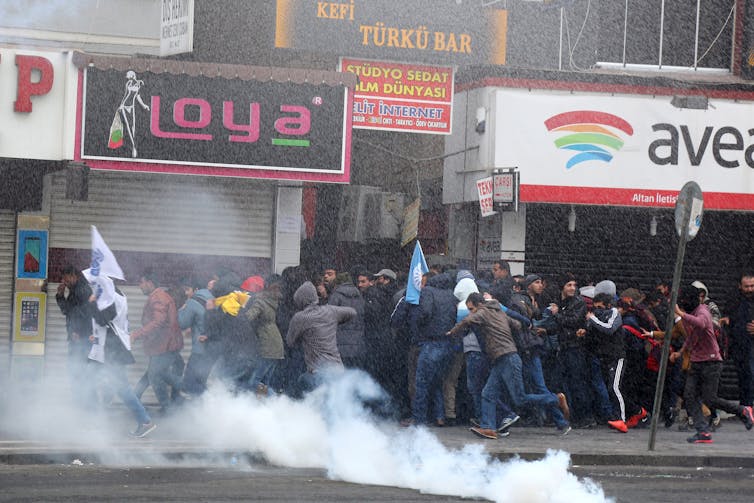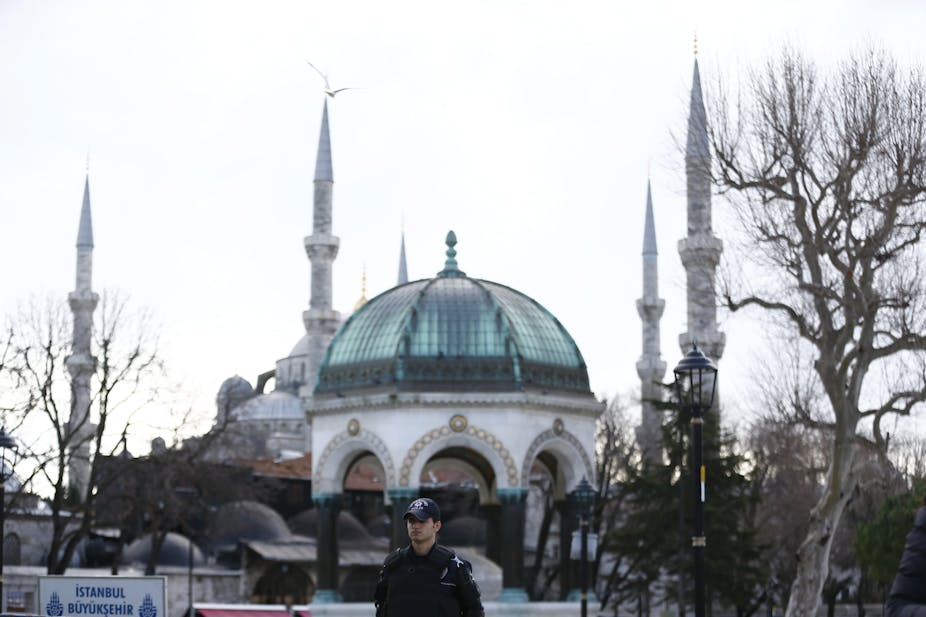The Islamic State has struck Turkey again, with another suicide attack – this time in Istanbul. The bombing killed 10 people, eight of whom were German tourists. The main suspect is Syrian but Turkish police have also detained three Russian nationals suspected of links to the attack.
Until now, IS has mainly targeted the south-east region of the country. It last attacked in Ankara in October 2015, killing more than 100 people. Sultanahmet, where this attack took place, is the most important tourist district of Istanbul. This bombing therefore marks a significant change in IS tactics in Turkey.
Turkey has recently been playing a much more active role in the US-led campaign against IS. It has, for example, taken part in aerial bombing in Syria, opening its Incirlik airbase to US warplanes. And more importantly, it has tightened its border with Syria, which has made it significantly harder for IS to meet its logistical needs. Hence, as warned by IS recently, Turkey like EU countries and the US, has now become a prime target for reprisal terrorist attacks.
If IS continues to target tourist hotspots, Turkey could suffer economically. The tourist industry accounts for a large proportion of employment and income in the country. The number of visitors to Turkey fell in 2015 and any more of a drop would carry significant economic implications. This is exactly how IS seems to want to punish Turkey.
Trouble at every turn
What’s more, the timing of the Istanbul attack could not have been worse. Violence has been spreading across the Kurdish dominated provinces of the southeast, where government forces have been battling the PKK since July 2015. According to the Turkish authorities, hundreds and even thousands of PKK militants have so far been killed in those security operations, but there have also been many civilian casualties.

The outlook is not much better on the international front either. Russia has become enemy number one as a result of the war of words that followed the downing of a Russian warplane last October. The latest development in this cold war has been the almost daily increase in economic sanctions on Turkey. It seems Vladimir Putin can’t get enough of turning the screw. Turkey-Russia relations might be worsening even further following the Russian arrests.
The deteriorating relations between Saudi Arabia and Iran over recent weeks are also a major headache for Turkey. Both have been pushing Turkey to make foreign policy choices, leaving it caught between a rock and a hard place. Moreover, Iraq has been getting increasingly agitated by Turkey’s economic and security pacts with the Kurdish Regional Government there.
In fact, the only silver lining on the international affairs front for Turkey at the moment is probably its thawing relations with Israel – and even that isn’t considered a positive by many.
Fallout for Syrians
One group in particular stands to pay a heavy price for this discouraging international outlook and increasing security threat levels on the ground, and that’s the millions of Syrian refugees living in Turkey.
According to Turkish authorities, the Istanbul suicide bomber was Syrian. The previous IS attacks were carried out by Turkish nationals who had joined jihadist groups in Syria.
There are now more than 2.5 million Syrian refugees in Turkey, which is putting a huge financial burden on public services. There is a danger that Turkish people are beginning to see these newcomers less as neighbours in need of help and more of a burden. Now, there is the danger that they will be seen as a security threat, too.
Turkey’s €3m deal with the EU to keep more of the refugees within its borders could fuel resentment on the Turkish side. Legislation to give them work permits will be passed through the parliament soon, which is likely to have social ramifications, as many Turks also face unemployment. And if Turkey fails to provide the help the Syrians need, they themselves might feel trapped in the wrong host country.
Who knows whether Islamic State took all this into account when planning the attack on Istanbul. The fallout from the incident is likely to be widespread and lasting. The situation could become particularly worrying in the regional security context, if there had been a Russian role in the Istanbul bombing, too.

